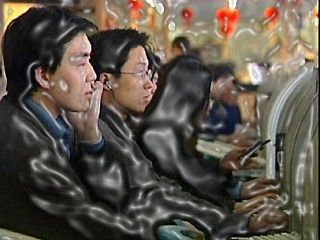China’s bosses recently rededicated themselves to a two-front “cultural security” war. Unfortunately the disparate forces they’re committing to those two fronts are mostly fighting at cross purposes.
At their recent convocation China’s Communist Party bosses concluded — astutely enough — that the image the outside world holds of China shapes the views of its own impressionable young generation to whom the internet is the window on the world. To enhance China’s image in world opinion the bosses have approved an expanded soft-power offensive. They hope to impart more of their own cultural, social and political spin to coverage of the outside world for Chinese consumption as well as coverage of China for both international and domestic consumption.
This soft power push includes the opening of new overseas studios. China will add several hundreds staffers to build studios in North America and Africa. The central government is also adding hundreds of journalists to its various state-run news outlets overseas to serve up correctly spun takes on outside events to Chinese and correct interpretations of Chinese events for foreigners.
The outward soft power push also includes investments in a movie industry to produce more films that impart politically correct spins on China’s history and current social situation. Films like Jet Li’s Hero are no less entertaining because they happen to reinforce the Communist Party line that each individual who sacrifices for the nation is the true hero.
The belief is that more exports of films and books produced under the watchful eye of China’s army of censors can only enhance China’s standing in the international cultural and artistic community by shaping the foreign views of China that its youth will come to embrace, thereby enhancing “cultural security”.
Then there’s the other front in China’s cultural security war — the home front. Here, the bosses prefer using hard power — the absolute authority to order compliance — over soft power. They’ve recently ordered the nation’s satellite TV networks to shut down popular talent competitions that had been decimating the viewership of state-run CCTV and replace them with more primetime news and cultural programs. Not only are information-oriented programs easier to censor, they won’t instill in the populace affection for democratic activities like deciding the outcome of contests by casting votes. One such casualty is Super Girl, a singing contest on Hunan Satellite TV that had become China’s highest-rated show until it was shut down last month under the pretext that it had violated time restrictions.
A growing army of censors — estimated at over 50,000 — has been deployed to control what China’s citizens can watch, read and write. On the internet censoring software filter out search terms like “Jasmine Revolution”, “June 4th” (the date of the Tiananmen Square massacre), “Nobel peace prize” (awarded in 2010 to jailed dissident Liu Xiaobo), even “empty chair” (the chair that Liu was unable to occupy at the Nobel ceremony) — any reference to events or ideas that might promote dissent. They delete or censor blog postings or weibo feeds by known dissidents or even those by random citizens whose posts could incite popular anger toward the Party. Propaganda officials are even thought to recruit and reward amateur propagandists who swamp dissidents’ microblog entries with hostile ripostes.
This exercise of hard power has forced online activists to cultivate an underground language to evade censors. For example, June 4th, 1989 has become May 35th or “535”. Images of empty chairs have come to represent not only Liu Xiaobo but any detention of activists. When a post is censored, activists say it has been “harmonized”, in satiric reference to Hu Jintao’s 2005 call for a “harmonious society” accompanied by the vigorous suppression of dissent.
The dark and satiric recognition of the realities of cultural and intellectual life under a repressive regime has, therefore, engendered an underground subculture calculated to be invisible to central government authority while undermining it. Millions of educated, intelligent Chinese are making the emotional and intellectual investment to acquire the arcane code language required to participate in this subversive subculture. The collective magnitude of this investment begs the question of the return these online activists will come to feel is sufficient reward.
For the moment, however, the subculture has become a formidable counter-weight to the Communist Party’s efforts at adding luster to China’s image. For every investment it makes in building up China’s soft power, the reaction of the subversive underground culture to its use of the hard power of repression through threat of detention diminishes whatever credit might otherwise have been given the central government for its very real achievements in improving the material lives of China’s people.
It’s an open question as to when the contest between the Communist Party’s clumsy misuse of hard power and the subversive soft power of China’s dissidents will come to an end. However, its use of hard power to suppress the free use of the internet and other media is more likely to subvert, rather than enhance, cultural security.

